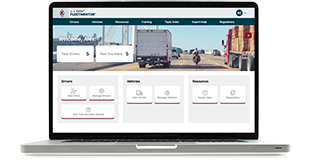Transport Safety Editor — J. J. Keller & Associates, Inc.
Leveraging Experience in Driver Training
Driver shortages and high turnover rates have been the norm for years. What can motor carriers do to not just attract — but retain — drivers? Best-in-class training can make the difference.
Published On: 12/04/2024


Written by:
Corrina Peterson
Driver retention has always been an Achilles heel for the trucking industry. Driver shortages and high turnover rates have been the norm for years. Driver retention will become even more critical as these shortages increase.
Bonuses, pay increases, and other rewards can attract drivers. But what can motor carriers do to separate themselves from the pack and not just attract — but retain — these drivers?
Best-in-class training can make the difference.
How can training help?
Carriers investing in best-in-class training accelerate driver skill development and show appreciation. The investment in training leads to:
- Improved driver retention;
- Lower crash rates;
- Fewer moving violations;
- Better Compliance, Safety, and Accountability (CSA) scores; and
- Decreased exposure to risk.
Pay increases have a diminishing effect on retention over time. Career and newer drivers are looking for employers committed to their employees.
An established and consistent training program demonstrates a commitment to keeping drivers’ skills sharp and maintaining safe operations. It shows prospective and current drivers that a company is serious about its culture of safety.
New-hire training
All drivers new to a carrier – from the individual fresh out of driving school to the veteran driver new to the motor carrier – should complete an appropriate driver training program at hire to:
- Understand carrier expectations,
- Correct improper techniques and unsafe habits, and
- Become familiar with administrative and operational procedures.
Experienced drivers need training?
Even the most experienced drivers must regularly review regulatory requirements and defensive driving techniques to avoid becoming complacent about the skills and habits needed to stay safe.
Career path for experienced drivers
Some of the best drivers leave their companies to improve themselves. A formal career advancement program can improve driver retention. Consider offering driver career path options, such as:
- Master Driver Trainer or Mentor – Offer this option for drivers who complete additional training to train others in all facets of driving and who can also be a mentor. Examples of additional training to achieve Master Driver status include:
- Delivering effective performance feedback;
- Defensive driving, including skid-pad skills; and
- Understanding Advanced driver assistance systems (ADAS).
- Driver Trainer or Yard Trainer – Offer this option for drivers familiar with company processes and possessing training skills but not at the Master Driver level. Training can be conducted on-road or restricted to a yard closed to public travel.
A best-in-class training program that engages drivers of all experience levels can reduce driver turnover and the risk of crashes. A highly skilled trainer who advanced through the career path options can more effectively influence positive behavior changes and correct skill deficiencies, thus reducing potential risk.
Use the FleetMentor Training Recordkeeping customizable feature to easily track your employee and driver training activities.
Not a FleetMentor user? Start your 30-Day Free Trial today!

J. J. Keller® FleetMentor® Service
The J. J. Keller® FleetMentor® System serves and supports thousands of transportation professionals every day with problem-solving tools and guidance. Whether you have one truck or a thousand, a fleet of commercial motor vehicles or F-150s, or haul goods or provide services — FleetMentor has you covered.
You may also enjoy the following articles:
Sign up for our newsletter!
We'll help you stay on top of regulations, best practices, and fleet industry news. Sign up to receive a monthly email notification with links to our most recent blog articles, free resources, and event invites.